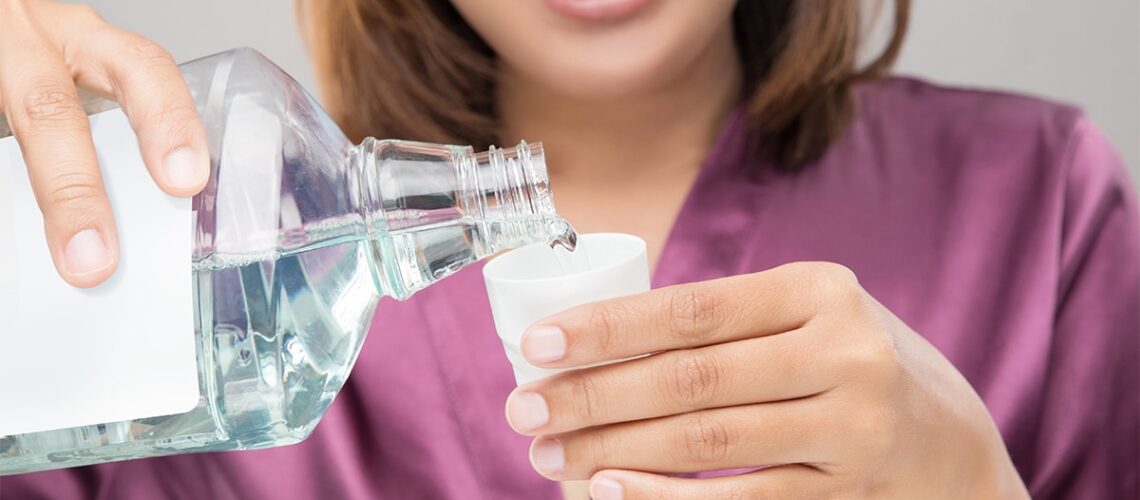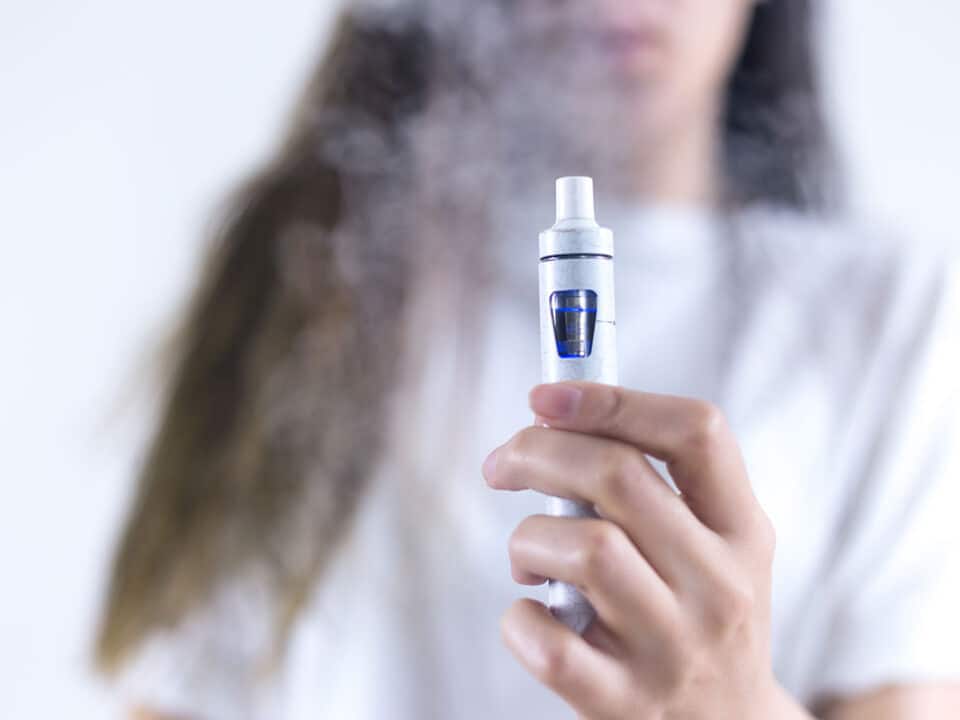Table of Contents
Brushing and flossing are the best ways to avoid oral health issues like gingivitis. If you add mouthwash into the equation, you’re set for success. Mouthwash is an effective tool in the fight against tooth decay, gingivitis and promoting healthy teeth and gums. Here is our list of the 8 useful benefits of using mouthwash.
What are the benefits of using mouthwash?
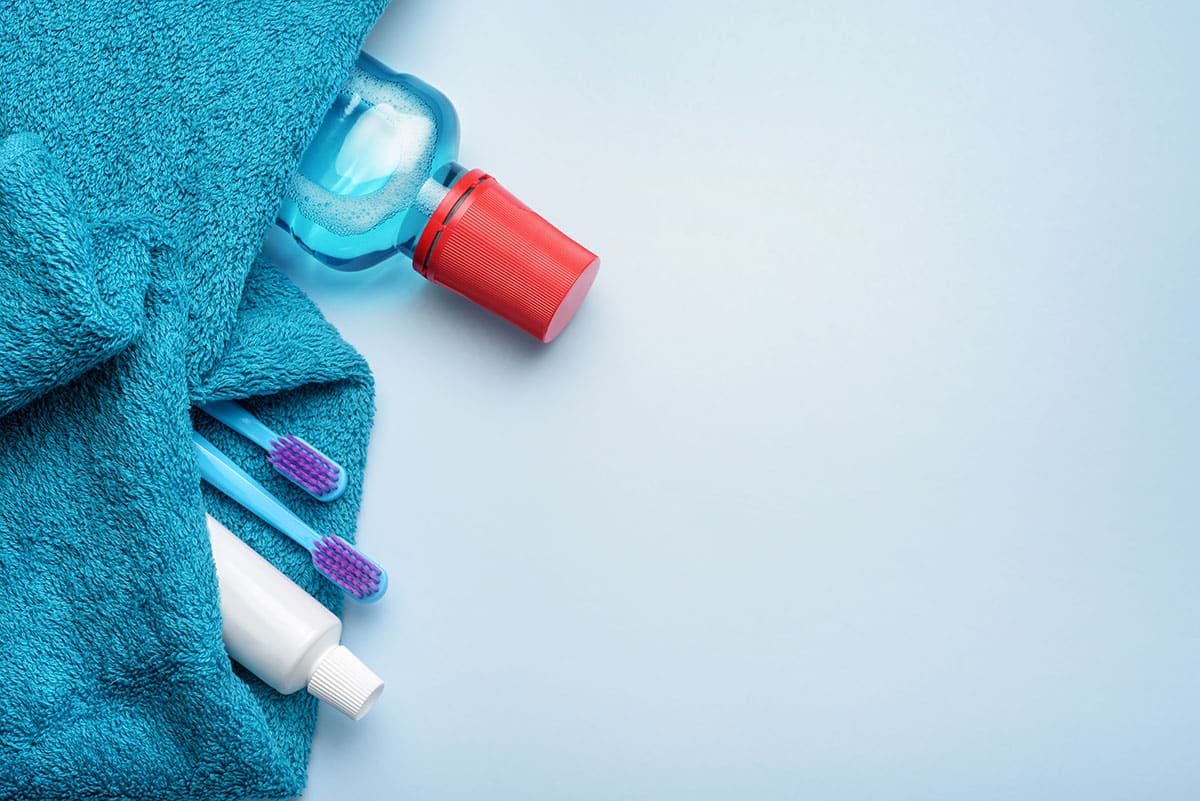
Mouthwash can offer several benefits as part of an overall oral hygiene routine. However, it’s important to remember that mouthwash should be used in conjunction with regular brushing and flossing not as a replacement. Here are some of the benefits of using mouthwash:
1. Freshens breath by neutralizing odours
First and foremost, one of the most obvious benefits of using mouthwash is that it temporarily reduces bad breath. With various flavours to choose from, mouthwash kills bacteria associated with causing bad breath, leaving you with minty fresh breath. It’s not just the flavour at work either; the antiseptic agents contained in many types of mouthwash work to kill the bacteria that cause bad breath and plaque as well.
2. Prevents Plaque build-up
Various types of mouthwash help prevent plaque build-up on your gums, in-between teeth, and the surface of your teeth between brushing. Although it prevents the build-up of plaque, it cannot reduce the plaque that already exists on your teeth. So remember that while mouthwash is a great addition to your hygiene routine, always brush and floss to remove the plaque before it becomes a problem.
3. Removes particles
Most people use mouthwash only after brushing. While this is a good practice, to get the most benefit from using mouthwash, it should also be used before brushing to rinse any loose particles in your mouth, making brushing and flossing more effective. We dentists always recommend rinsing your mouth after a meal and periodically during the day, and adding mouthwash can be a good idea.
4. Helps stop cavities from forming
With regular use of mouthwash before and after you brush and floss, you can reduce the chances of cavities forming by reducing the number of food particles and bacteria in your mouth. Mouthwashes that provide this benefit will contain fluoride, which makes them great at preventing cavities and strengthening your tooth enamel. This is especially beneficial for individuals at a higher risk of developing cavities, but remember, not all mouthwashes contain fluoride. Be sure to check the label on your mouthwash before purchasing.
5. Kills harmful bacteria
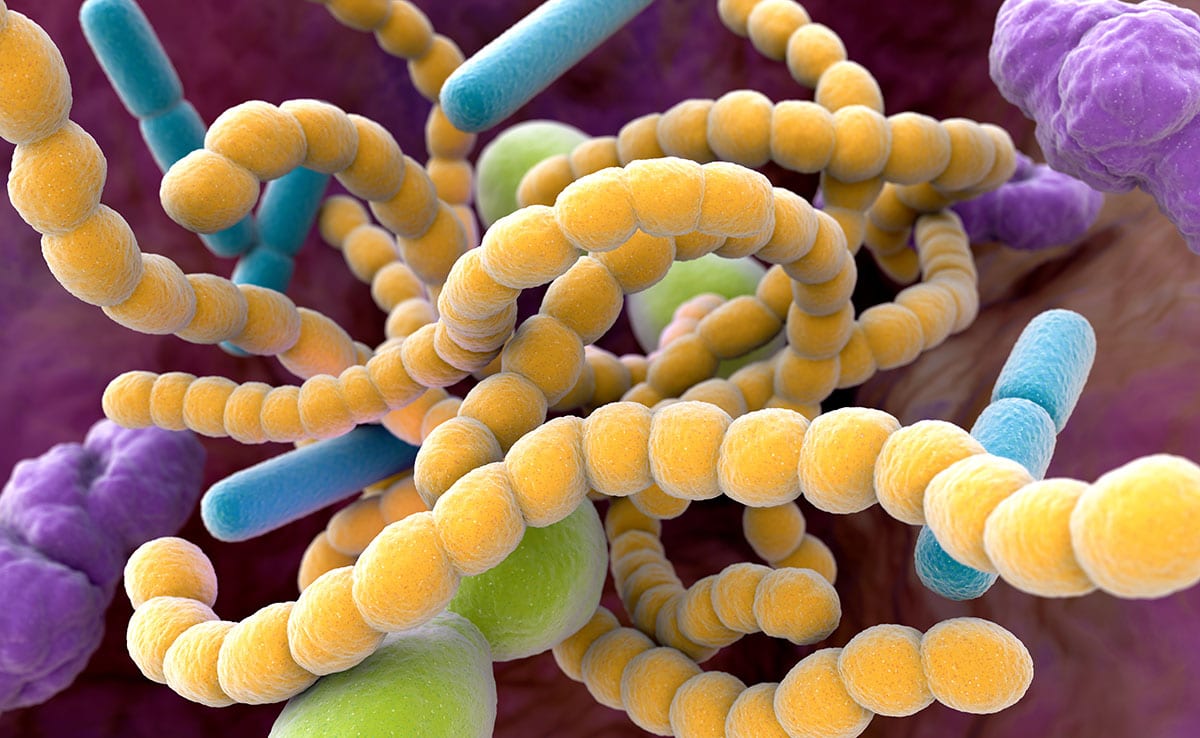
One of the main benefits of using mouthwash is that it kills harmful bacteria in your mouth. One of the primary causes of bad breath is the accumulation of bacteria in the mouth. These bacteria feed on food particles and produce volatile sulphur compounds with an unpleasant odour. These same bacteria will also become plaque if not removed from your teeth. Many mouthwashes contain antiseptic agents like chlorhexidine, cetylpyridinium chloride, or essential oils that help kill these bacteria.
6. Fights gum disease
One of the biggest benefits of mouthwash is that it helps guard against gum disease. By reducing bacteria and plaque, mouthwash can help prevent gum disease (gingivitis) caused by plaque build-up. Mouthwash can also help keep irritated gums clean, so if your gums bleed after flossing, applying some mouthwash and not rinsing it off can help.
7. Soothes canker sores
Using mouthwash can help clean canker sores and reduce the number of bacteria irritating them. This may aid in the healing process and reduce the amount of irritation and pain you feel.
8. Whitens your teeth
There are mouthwashes available that are formulated with teeth-whitening agents like hydrogen peroxide. These can help to remove stains and whiten the teeth over time with regular use. These are also effective at maintaining whiter teeth after a whitening treatment. A whitening mouthwash is best used after meals when surface stains are just beginning to affect the colour of your teeth.
Are alcohol-free mouthwashes better?
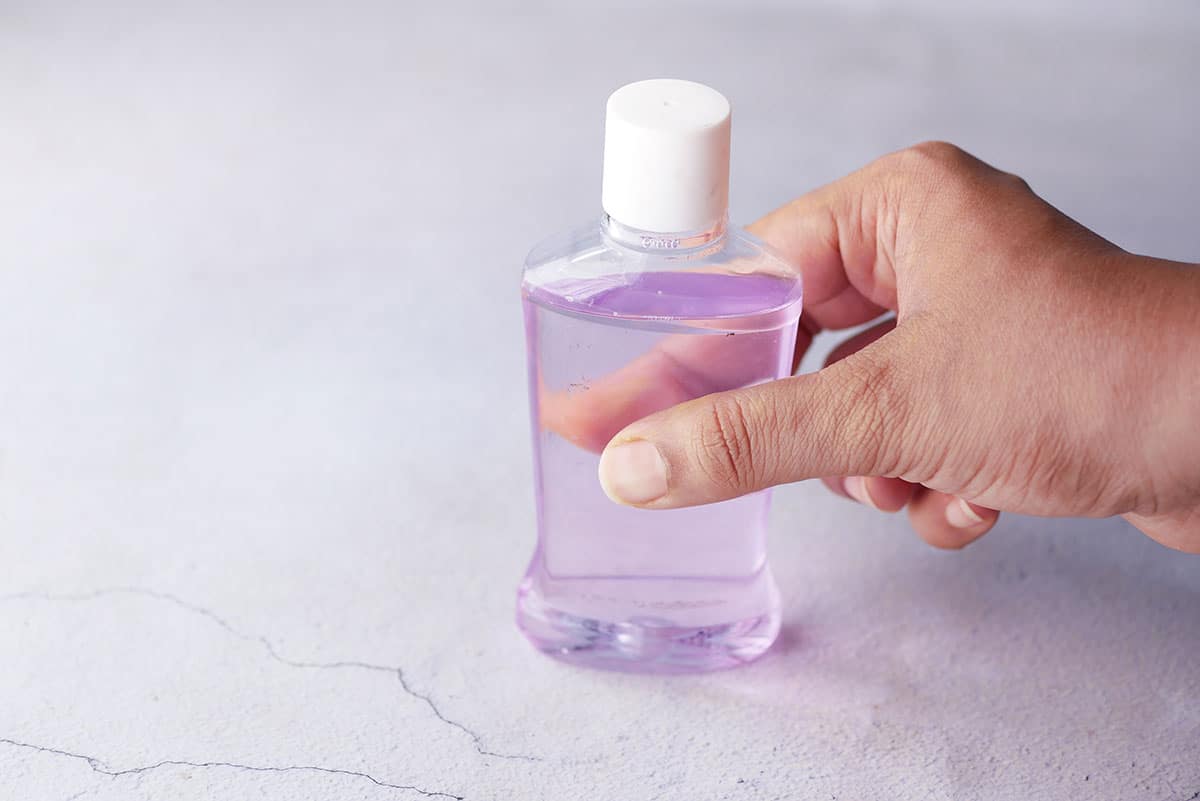
Alcohol-free mouthwash has gained popularity because it offers several advantages over traditional alcohol-containing options. Most dentists, including those at our Martindale Dental clinics, will advise our patients to use only alcohol-free mouthwashes for various reasons. Here are some of the benefits of using alcohol-free mouthwash:
1. Less irritating to your mouth
Alcohol can be an irritant, especially for people with sensitive mouths, sores, or gum issues. That’s why one of the great benefits of alcohol-free mouthwash is that it is generally gentler and less likely to cause discomfort or a burning sensation.
2. Doesn’t dry out your mouth
One of the downsides of alcohol in mouthwash is that it can dry out the mouth by reducing saliva production. A dry mouth can actually contribute to bad breath and increase the risk of tooth decay. Alcohol-free mouthwash doesn’t have this drying effect and is thus more suitable for people with dry mouth conditions (xerostomia).
3. Safer for children
Alcohol-free mouthwashes are safer for children, as there’s no risk of ingesting alcohol. Children need to avoid alcohol, and alcohol-free mouthwash eliminates this concern.
4. They often taste better
Some people find the taste of alcohol-containing mouthwashes too strong or unpleasant. Alcohol-free mouthwashes often have a milder taste, which some users find more palatable.
5. Won’t affect dental restorations
Alcohol can, in some cases, adversely affect the integrity of dental restorations such as composites or adhesives used in dental work. Alcohol-free mouthwash avoids this issue.
6. Suitable for people with alcohol sensitivity or certain beliefs
Some individuals might avoid alcohol for personal, religious, or health reasons. Alcohol-free mouthwash allows these individuals to maintain oral hygiene without compromising their preferences or beliefs.
7. Reduced risk of oral cancer
There has been some debate regarding the association between alcohol-containing mouthwashes and oral cancer. Although a definitive link has not been established, some studies suggest a possible association. Opting for an alcohol-free mouthwash eliminates this potential risk.
8. Less tooth staining
Certain alcohol-containing mouthwashes, especially those with chlorhexidine, can cause teeth staining with prolonged use. Most alcohol-free mouthwashes do not contain chlorhexidine and are less likely to cause staining.
How to use mouthwash to get the most benefits
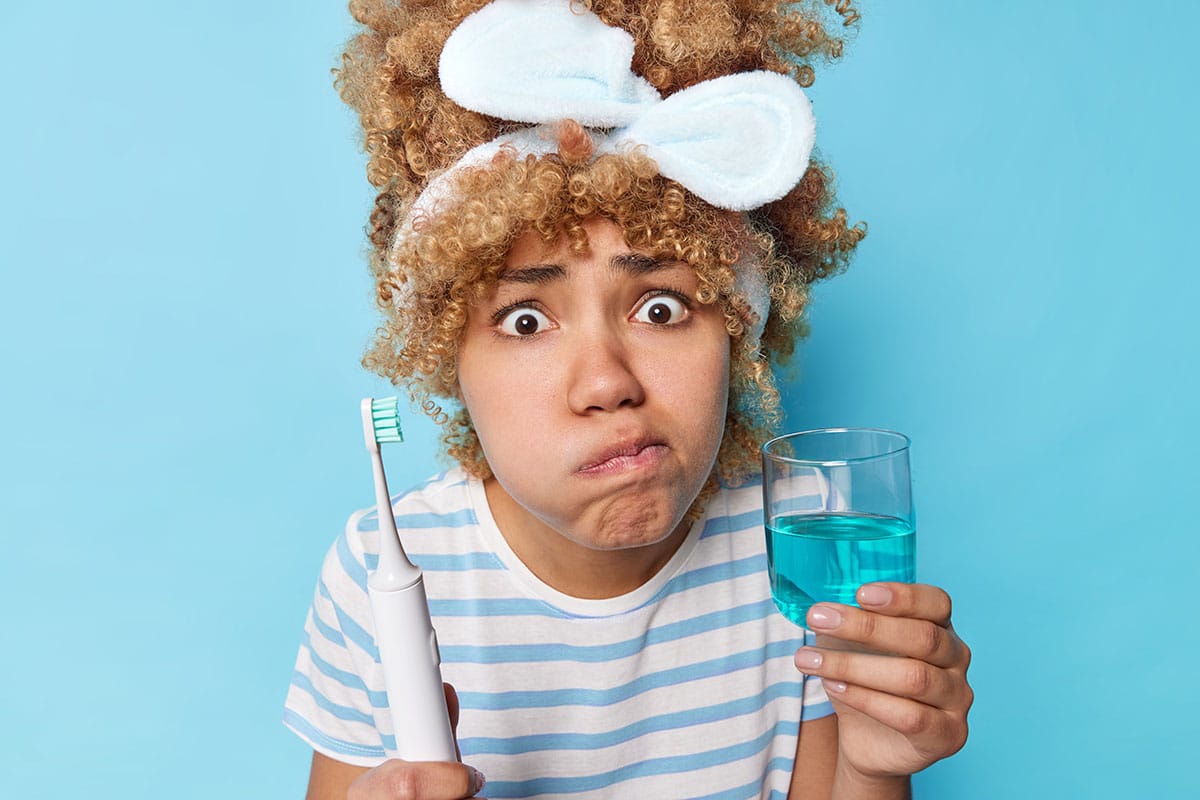
Using mouthwash properly can help maximize its benefits. Here’s a step-by-step guide on how to use mouthwash effectively:
1. Start with a clean mouth
It’s most effective to use mouthwash after thoroughly brushing and flossing your teeth. This ensures that any loose debris has been removed and the mouthwash can reach all areas of your mouth.
2. Measure the right amount
Read the instructions on the bottle for the recommended amount. This is usually around 20ml or roughly four teaspoons. Some mouthwashes come with a cap that doubles as a measuring cup.
3. Pour into your mouth
Pour the mouthwash into your mouth. Do not dilute it with water unless the instructions specifically tell you to do so.
4. Swish vigorously
Close your mouth and swish the mouthwash around. Make sure it reaches all areas, including your gums, teeth, and tongue. Swish for the amount of time recommended on the bottle, usually around 30 seconds to a minute.
5. Gargle with it
If you’re comfortable, tilt your head back and gargle for a few seconds to allow the mouthwash to reach the back of your throat and tongue, where bacteria can accumulate.
6. Make sure to spit it out
After swishing and gargling, spit the mouthwash out into the sink. Avoid swallowing the mouthwash as it contains ingredients not meant to be ingested.
7. Don’t rinse, eat or drink immediately
Don’t rinse your mouth with water immediately after using mouthwash; this can wash away the active ingredients. Also, avoid eating or drinking for about 30 minutes after using mouthwash to keep the active ingredients in contact with your teeth and gums.
8. Use regularly
For the best results, use mouthwash regularly as part of your daily oral hygiene routine. However, be cautious not to overuse it, especially if it contains alcohol, as it can irritate the mouth.
Is it safe to swallow mouthwash?

It is strongly advised not to swallow mouthwash. Mouthwashes are formulated with ingredients intended for rinsing the mouth and not meant for ingestion. Swallowing small amounts accidentally is usually not harmful, but intentionally swallowing mouthwash can have several negative consequences:
Alcohol content
Many mouthwashes contain alcohol, which should not be ingested in large quantities. Consuming mouthwash with alcohol can be harmful, especially for children.
Antiseptic agents
Mouthwashes often contain antiseptic agents that can be harmful if swallowed. These agents are meant to kill bacteria in the mouth but are not safe for consumption.
Fluoride shouldn’t be ingested
Mouthwashes containing fluoride are beneficial for protecting tooth enamel, but swallowing large amounts of fluoride can be harmful and lead to toxicity.
Gastrointestinal irritation
The ingredients in mouthwash can irritate the stomach and digestive tract if swallowed. This can lead to nausea, vomiting, or diarrhea.
Poisoning risk
In large quantities, the chemicals in mouthwash can be toxic and pose a poisoning risk. This particularly concerns children who might not understand the importance of not swallowing mouthwash.
What are the disadvantages of using mouthwash?

While mouthwash offers many benefits as part of an oral hygiene routine, there are also potential disadvantages and side effects associated with its use:
1. Oral irritation is possible
Some mouthwashes, especially those containing alcohol, can irritate the mouth, including a burning sensation, and can aggravate existing sores or sensitive gums.
2. Mouthwash can cause dry mouth
Alcohol-containing mouthwashes can reduce saliva production, leading to a dry mouth. A dry mouth can be uncomfortable, contributing to bad breath and an increased risk of tooth decay.
3. Masking underlying issues
While mouthwash can temporarily freshen breath, it may also mask the symptoms of underlying oral health issues like gum disease or tooth decay, delaying necessary treatment.
4. Overuse can alter taste perception
Some people report a change in taste after using mouthwash. This is usually temporary but can be bothersome for some individuals.
5. Risk of tooth staining
Mouthwashes containing chlorhexidine can cause brown staining on teeth with prolonged use.
6. Oral tissue discoloration
Certain ingredients in mouthwashes, such as chlorhexidine, can sometimes cause tongue discoloration or increase tartar build-up.
7. Fluoride overdose potential if misused
Suppose a mouthwash contains fluoride and is used excessively or swallowed. In that case, there is a risk of consuming too much fluoride, leading to dental fluorosis (discoloration and pitting of the teeth) or other health issues.
8. Potential link to oral cancer
There has been some debate regarding the association between alcohol-containing mouthwashes and oral cancer. While a definitive link has not been established, some studies suggest a possible association.
9. Possibility of allergic reactions
Some individuals may have an allergy or sensitivity to certain ingredients in mouthwash, such as preservatives, flavourings, or other compounds. This can lead to allergic reactions, rashes, itching, or respiratory symptoms.
10. Damaging effect on dental restorations
As previously mentioned, alcohol can sometimes adversely affect the integrity of dental restorations such as composites or adhesives used in dental work.
Does mouthwash harm tooth enamel?

Mouthwash can affect tooth enamel differently depending on its ingredients and use. Generally, most mouthwashes are formulated to be safe for tooth enamel. If you have concerns about tooth enamel or are unsure which mouthwash to use, consult a dentist for recommendations based on your oral health needs.
In conclusion: Do the benefits of using mouthwash outweigh the potential negatives?
As dentists, we recommend using mouthwash, provided that patients do so correctly. This means using an alcohol-free mouthwash designed for its intended purpose in the manner it was designed for. Our patients get a lot of benefits from using mouthwash, and reducing oral bacteria is one of the best things we can do for the health of our mouths. Reduced bacteria means less plaque, fewer cavities, less gum disease and better breath. While there are some slight risks of side effects with using mouthwash, these are almost always linked to misuse of the products. On top of that, the build-up of harmful bacteria in your mouth is one of the root causes of most oral health issues. Remember to use mouthwash as part of your oral hygiene routine alongside brushing and flossing to get the most out of the benefits of using mouthwash. Always consult your dentist before using a mouthwash product and discontinue use if irritation or other side effects occur.
Check us out on Facebook and Twitter for daily information about Oral Health from Martindale Dental, or visit our offices in Hamilton and St. Catharines.
Have more questions?
Please contact us for all inquiries or to book an appointment with one of our convenient clinic locations. We look forward to hearing from you.

